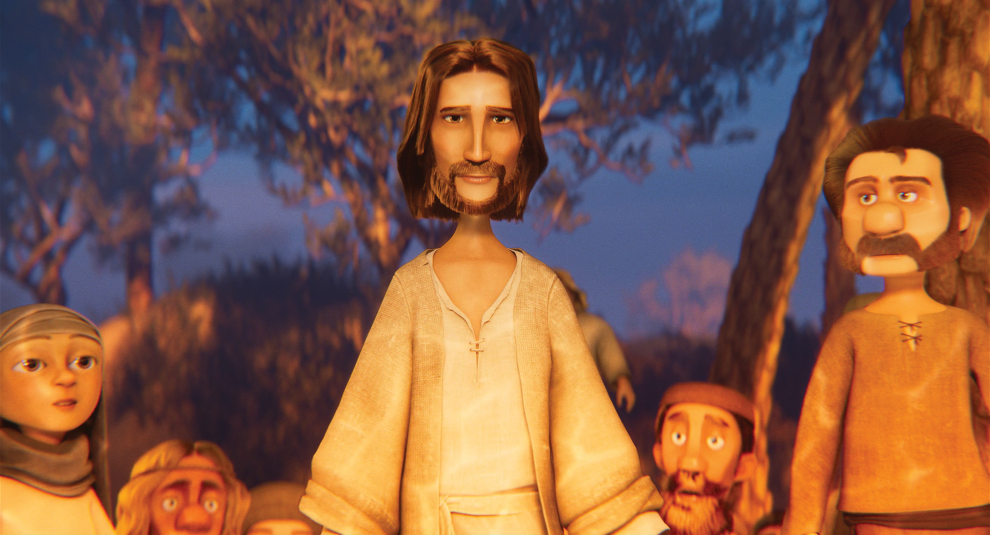For our Sounding Board column, U.S. Catholic asks authors to argue one side of a many-sided issue of importance to Catholics around the country. We also invite readers to submit their responses to these opinion essays—whether agreement or disagreement—in the survey that follows. A selection of the survey results appear below, as well as in the October 2025 issue of U.S. Catholic. You can participate in our current survey here.
The survey says . . .
There are ____ biblical movies being made.
- Not enough – 20%
- Too many – 36%
- The right amount of – 44%
What do you think should be the primary purpose of a Jesus movie?
- To provoke theological or philosophical questions – 33%
- To enrich one’s faith and devotion – 32%
- To educate – 13%
- To evangelize – 8%
- To entertain – 7%
- Other – 7%
Do you think ” comfort food” Jesus movies are valuable?
- Yes, they help me reconnect with the story of Jesus – 22%
- Sometimes, but I also want new insights – 48%
- No, they don’t add anything meaningful to my spiritual life – 30%
The phenomenon of “twin movies”—two or more films with strikingly similar plots or subject matter released in close proximity—is almost as old as Hollywood itself. I remember a remarkable string of them in the 1990s (among others, two 1993 Wyatt Earp movies, two talking-piglet family films in 1994/95, and three 1997 volcano disaster movies).
Two Jesus movies in the same year, then, may not be all that surprising—but what about two or even three sets of twin Jesus productions, for a total of six productions in a single year? 2025 has to be some kind of record!
In March and April, moviegoing fans of Dallas Jenkins’s powerhouse franchise The Chosen were baffled by screening options for two productions both named for the Last Supper. The one they wanted, The Chosen – Last Supper, was a three-part Fathom Entertainment release, but an unrelated faith-based movie, confusingly also called The Last Supper, was also in theaters.
There were also a pair of animated life-of-Christ movies. In April Angel Studios distributed The King of Kings, a computer-animated Jesus movie ostensibly based on Charles Dickens’s posthumously published The Life of Our Lord. Then in September came Light of the World, a hand-drawn animated take on Jesus’ life seen through the eyes of a very young John son of Zebedee.
Finally, two very different 2025 movies might be said to offer genre angles on infancy-narrative material—though that’s misleadingly ambiguous. Matthew’s infancy narrative is a main source for Zero A. D., a faith-based Angel Studios thriller arriving just before Christmas and focusing particularly on Herod the Great and the slaughter of the innocents. The other film, The Carpenter’s Son, finds fodder for horror in the apocryphal Infancy Gospel of Thomas; at this writing no firm date has been set, but it’s planned for this fall.
2025 may be an anomaly, but it didn’t come out of nowhere. Last year, we had the first Jesus film in American Sign Language (or any sign language) and a Netflix thriller about the Virgin Mary drawing on another apocryphal infancy gospel, the Protoevangelium of James. In 2023 there was yet another Nativity film, Journey to Bethlehem and a Jesus-movie comedy, The Book of Clarence, with a premise somewhat reminiscent of Monty Python’s Life of Brian.
Ten years ago, Bible movies seemed all but dead. 2014 featured two major Hollywood Old Testament films: Darren Aronofsky’s mad Noah and Ridley Scott’s revisionist Exodus: Gods and Kings, both box-office flops. That same year, Son of God, a feature film adapted from the miniseries The Bible, was hugely popular with faith audiences—yet this wasn’t exactly a hopeful sign, creatively speaking. Son of God is the epitome of “preaching to the choir” faith-based entertainment: a “greatest hits” medley of Gospel material with no particular perspective or guiding insight. It tells true believers only what they already know, and it has little to offer anyone else.
Such undemanding, pious comfort food remains popular with Christian audiences. The King of Kings, despite its Princess Bride–style framing story with Charles Dickens regaling his half-skeptical, half-rapt son with the Gospel story, covers the expected material with no surprises—which didn’t stop it from becoming another big hit. Light of the World is a bit more interesting thematically, highlighting the contrast between Jewish expectations regarding the Messiah and what Jesus actually says and does. It also lapses at times into Sunday-school catechesis, briefly becoming something more like an educational Bible Project video than a dramatic interpretation of Jesus’ life.
Well, what’s wrong with comfort food? People like what they like for a reason. Art doesn’t have to be challenging or difficult! Most of us have grown up with these stories and know them by heart. If people enjoy straightforward retellings that only tell them what everyone already knows, what’s the problem?
Readers weigh in:
I enjoy watching biblical movies and shows because when written accurately and with few artistic liberties moving away from the Bible, the movies serve two purposes for me. Firstly, they reinforce my faith and love of Christ with reenactments of Old and New Testament stories. Secondly, they provide a refreshing story without violence, sex, and similar topics as their primary message.
Ron Signore
El Paso, Texas
Being overly sincere gets you almost nowhere: You need some humor or some real humanity. This sincerity is a strength as well, in a way, but if you treat the gospels with kid gloves you miss the point. The story of Jesus is messy and human.
Maureen
Germantown, Md.
Jesus movies’ biggest weaknesses are lazy filmmaking, heavy-handed messaging, and fundamentalist oversimplification. Their biggest strength is the story itself. It’s the kind of steak that doesn’t require much seasoning.
Name withheld
One potential problem is that a depiction of Jesus’ life that tells us only what everyone “already knows” actually tells us less than that—because what we know so well in one sense, we see only dimly in another. Paradoxically, overfamiliarity obscures the text—a difficulty all good homilists grapple with as they seek to make the readings fresh time and again. It’s hard to feel the essential surprise in stories we know too well, and a retelling or revisiting that doesn’t awaken us to the surprise further dulls us to it.
Take the depiction of Jesus’ rejection at Nazareth in Son of God. As assailants surround Jesus, Peter moves to fight back, only to be called up short by the Lord: “Peter—turn the other cheek.” This now time-honored phrase from the Sermon on the Mount isn’t set up or presented as a startling new code; Jesus simply throws it out the way you or I might do, expecting Peter to know what he means. The stinging challenge of Jesus’ radical reversal of the lex talionis (“an eye for an eye”), dulled by centuries of familiarity, is further eroded. If Peter doesn’t feel it, neither do we!
The most shocking and revolutionary three words in Jesus’ moral teaching—“Love your enemies”—are likewise trivialized in the same production company’s 2016 Ben-Hur by the title character’s blasé response: “That’s very progressive.” This issue meets us in Old Testament movies too. In Pure Flix’s 2018 Samson, Samson’s brother Caleb refers glibly to hearing “a still small voice,” as if Elijah were not still centuries in the future. The apophatic power of the refrain that it was not in the might of such phenomena as wind, earthquakes, or fire that the Lord was found is negated by the absence of any suggestion that he might be; the significance of a “still small voice” is taken for granted.
Perhaps the essential dilemma for any Jesus movie is the challenge of depicting Jesus as both divinely authoritative and humanly approachable—as someone you can imagine both leaving your nets to follow and also actually hanging out with and enjoying his company. Very few Jesus movies manage more than one side of the mystery; too many manage neither. (To give notable 20th-century examples: Robert Powell in Franco Zeffirelli’s generally excellent Jesus of Nazareth is a “leave your nets” Jesus; Jeremy Sisto in the amiable 1999 Jesus is a “hanging out” Jesus. For a Jesus who is both, I refer you to my favorite Jesus film, also animated: the low-key brilliant 1999 stop-motion The Miracle Maker, with Ralph Fiennes voicing Jesus.)
Neither of 2025’s animated Jesus movies manages to make Jesus much more than a benign, good-humored avatar for Christological piety. (The King of Kings has a slight advantage here in the casting of Oscar Isaac, who gives a bit of edge to some of Jesus’ lines.) Both depict, at best, a “hanging out” Jesus, and even then I’m not sure he would be all that interesting for long.
What about The Chosen, the success of which is largely responsible for the current glut of Jesus content? To a creditable extent, Jenkins manages to have his cake and eat it too. By taking a novelistic approach, inventing back stories, subplots, and characterizations while avoiding direct conflicts with the biblical texts, The Chosen manages to be comfort food while also challenging viewers to reimagine remote biblical figures and episodes in the light of familiar people and events. What if one of the disciples was autistic, like Jenkins’s Matthew? Can we imagine one of Jesus’ disciples suffering from some disability that, like people with disabilities in our lives, Jesus for whatever reason didn’t heal? Could Jesus have practiced talking points for the Sermon on the Mount? The result of Jenkins’s canny approach is a project with appeal well beyond the faithful; nearly a third of the series’ viewership are reportedly not practicing Christians.
I may not agree with every liberty taken by The Chosen—or The Miracle Maker, or Jesus of Nazareth, or any other Jesus production I appreciate. I definitely don’t agree with every wild twist in Aronofsky’s Noah, but I love it. Even Exodus: Gods and Kings, with all its faults, is a movie that at this moment I would rather sit down and rewatch than the bland and unsurprising Son of God. Of all upcoming Bible projects, the one I most hope will deliver is Jenkins’s Moses series. The story of Moses and the Exodus is the single most cinema-ready story in the Bible, and it’s been over a quarter century since the last really solid retelling, DreamWorks Animation’s masterful 1998 The Prince of Egypt.
As for future Jesus movies, from Mel Gibson’s long-gestating Resurrection of the Christ project (now two movies aiming for a 2027 release) to the legendary auteur Terrence Malick’s Jesus project The Way of the Wind (no release date set), I genuinely have no idea what to expect—and that, as far as it goes, is a good thing. An unsurprising Jesus is a Jesus who has nothing to teach me.
Survey results are based on responses from 75 uscatholic.org visitors.
This article also appears in the December 2025 issue of U.S. Catholic (Vol. 90, No. 12, pages 31-35). Click here to subscribe to the magazine.
Image: Courtesy of Angel Studios













Add comment